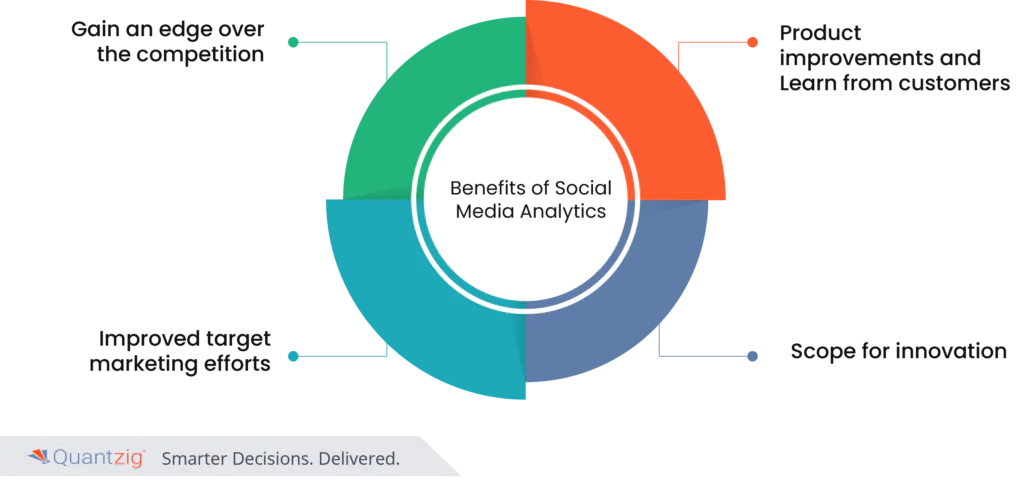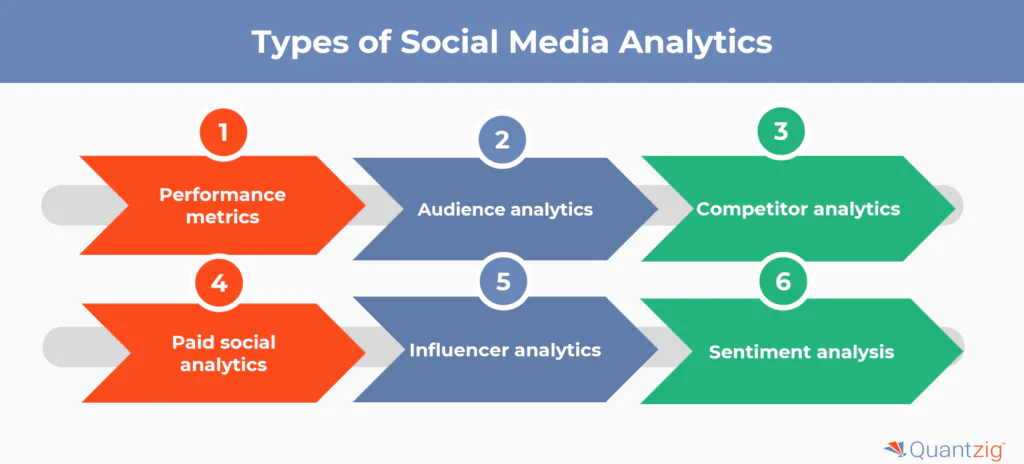Table of Contents
Introduction to Social Media Analytics
B2B organizations leverage social media analytics to gain valuable insights into their target audience’s engagement with their marketing content. By analyzing key metrics such as reach, impressions, and sentiment, businesses can better understand their customers’ interests, priorities, and preferences. This data-driven approach empowers companies to refine their digital marketing strategies, optimize content creation, and foster stronger relationships with their B2B clientele. Mastering social media analytics is a crucial component of effective B2B marketing, enabling organizations to make informed decisions, enhance brand awareness, and ultimately drive business growth.
This article delves into social media analytics, exploring its significance, key metrics, and the tangible benefits it can bring to B2B organizations.
Request a demo to experience the meaningful insights we derive from data through our analytical tools and platform capabilities. Schedule a demo today!
Request a Free DemoWhat are Social Media Analytics?
Social media analytics (SMA) refer to the systematic collection, analysis, and interpretation of data generated from an organization’s presence and engagement on various social media platforms, providing valuable insights into customer behavior, content performance, and brand sentiment. By leveraging SMA, businesses can gain a deeper understanding of their target audience’s interests, preferences, and interactions, enabling data-driven decisions and optimizing social media strategies.
This data-driven approach empowers organizations to make informed choices, foster stronger relationships, and drive measurable results in the dynamic digital landscape. Ultimately, SMA is a powerful tool that helps businesses align their content and messaging with the evolving needs and expectations of their customers.
What is the Importance of Social Media Analytics for B2B Businesses?
In the digital age, social media has become a powerful tool for marketing and business growth. However, navigating the vast sea of comments, feedback, and interactions a brand encounters on platforms like Facebook, YouTube, Instagram, Twitter, and LinkedIn can be a daunting task. This is where social media analytics and media monitoring come into play as indispensable tools.
1. Unlocking Insights with Social Media Analytics
Social media analytics goes beyond basic data analysis—it’s about extracting actionable insights from social platforms to drive strategic business decisions. By analyzing social media data, businesses can understand public perception, customer preferences, and identify key pain points.
2. Staying Ahead with Media Monitoring
Media monitoring complements social media analytics, offering insights into brand perception from customers, competitors, and stakeholders. It involves social listening and performance analysis to guide brand management, product development, and competitive positioning.
3. Comprehensive Reporting and Decision Support
Our advanced BI and analytics solutions provide in-depth reporting and decision support to address complex business challenges. Benefit from services like social listening, sentiment analysis, and brand health assessment. Explore our 4-week complimentary pilot, a risk-free opportunity to experience our comprehensive offerings.
Through our advanced BI and business analytics solutions, we offer comprehensive reporting and decision support to solve your complex business challenges. Engage in our 4-week complimentary pilot, a no-cost opportunity to explore our portfolio of services including social listening, sentiment analysis, brand health assessment, and more, without any hidden clauses.
Experience the advantages firsthand by testing a customized complimentary pilot designed to address your specific requirements. Pilot studies are non-committal in nature.
Request a Free TrialWhat are the Types of Social Media Analytics?
Social media analytics (SMA) is the process of collecting, analyzing, and interpreting data generated from an organization’s presence and engagement on various social media platforms. By leveraging SMA, businesses can gain valuable insights into their marketing efforts, audience behavior, and competitive landscape, ultimately driving informed decision-making and optimizing their social media strategies.
| Social Media Analytics Type | Description |
|---|---|
| Performance Metrics | Tracks user interactions, click-through rates, and follower growth to evaluate the effectiveness of social media marketing campaigns. |
| Audience Analytics | Analyzes audience demographics, behavior, and interests across channels, helping businesses tailor content to their target market. |
| Competitor Analytics | Assesses competitor strategies and audience engagement to identify opportunities for improvement and align with best practices. |
| Paid Social Analytics | Evaluates the ROI of sponsored posts by analyzing ad costs, clicks, and revenue impact. |
| Influencer Analytics | Measures influencer impact on brand reach and engagement, providing insights on influencer marketing effectiveness. |
| Sentiment Analysis | Reviews customer responses and campaign favorability, tracking purchases and overall impact on consumer behavior. |
By mastering these analytics, businesses can optimize strategies, understand their audience, and gain a competitive edge in the digital landscape.
What are the Top Metrics for Social Media Analytics?


Here are the top 6 metrics for social media analytics:
- Reach: Measures the total number of unique users who have seen your content across social media platforms.
- Engagement Rate: Tracks the level of interaction your content receives, such as likes, comments, shares, and clicks.
- Impressions: Counts the total number of times your content has been displayed, regardless of whether it was interacted with or not.
- Click-Through Rate (CTR): Measures the percentage of users who click on your content after seeing it.
- Conversion Rate: Tracks the percentage of users who take a desired action, such as making a purchase or signing up for a newsletter, after engaging with your content.
- Audience Demographics: Provides insights into the characteristics of your target audience, including age, gender, location, and interests.
By closely monitoring these key social media metrics, businesses can gain valuable insights into the performance of their content, the behavior of their target audience, and the overall effectiveness of their social media marketing strategy.
Experience the advantages firsthand by testing a customized complimentary pilot designed to address your specific requirements. Pilot studies are non-committal in nature.
Request a Free TrialWhat are the Key Benefits of Social Media Analytics?

1. Gain an Edge Over the Competition:
Social media analytics empowers companies with critical data analysis and meaning extraction from social media platforms like Facebook, Instagram, and Twitter. It provides insights not only about a brand’s performance but also about competitor actions and customer response to competitors. This comprehensive view helps businesses understand customer sentiment, identify high-value product features, and recognize competitor activities, leading to strategic decisions and a competitive advantage in the market.
2. Product Improvements:
Customer feedback on social media channels serves as a rich source of information for product development. Brands can use media monitoring tools to analyze customer sentiment and reviews, turning negative comments into opportunities for product enhancements. This process of continuously learning from customer experiences leads to improved offerings, contributing to customer delight and loyalty.
3. Learn from Customers:
Social media marketing on platforms like Facebook and YouTube has become a critical avenue for expanding a customer base. Customers often share practical solutions to product-related issues, providing valuable insights for brands. Companies can leverage this user-generated content, such as Facebook posts or Amazon product reviews, for aggregate analysis, helping to refine product documentation and user guides.
4. Improved Target Marketing Efforts:
Advanced analytics techniques enable brands to gain timely insights on demographic and psychographic characteristics across individual channels like LinkedIn and Reddit. This information is crucial for targeting marketing campaigns, particularly internet-based marketing campaigns, and optimizing marketing services for specific customer segments.
5. Scope for Innovation:
By employing social media analytics tools, companies can uncover capability gaps in the market. Insights gained from social listening on various platforms can inform innovation strategies, such as the minimalist trend in the running shoe market driven by user feedback. Brands that effectively harness user feedback for brand management and product innovation tend to achieve greater success.
Get started with your complimentary trial today and delve into our platform without any obligations. Explore our wide range of customized, consumption driven analytical solutions services built across the analytical maturity levels.
Start your Free Trial nowConclusion
In conclusion, social media analytics plays a pivotal role in shaping social media strategy and strengthening market presence. From enhancing brand management to fostering product innovation, insights from social media data are invaluable. Leveraging advanced technologies like machine learning algorithms and real-time analytics, businesses can gain a competitive edge.
By analyzing customer sentiments and behaviors, companies can tailor products, services, and marketing strategies for greater impact. In the dynamic world of digital marketing, AI in social media is a critical tool for business growth and success.






